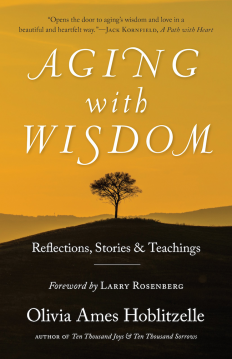[box type=”shadow” align=”” class=”” width=””]Aging with Wisdom: Reflections, Stories & Teachings By Olivia Ames Hoblitzelle 206 pp., $16.95 Monkfish Book Publishing Co., 2017[/box]
More than 5 million Americans suffer from Alzheimer’s disease, which results in severe memory loss and physical deterioration — and the numbers are growing.
The writer Olivia Ames Hoblitzelle lost her husband and mother to this awful ailment. She first wrote about the subject several years ago in “Ten Thousand Joys & Ten Thousand Sorrows: A Couple’s Journey Through Alzheimer’s,” a poignant recounting of the struggle of dealing with this terrible malady.
She has now written a second book, “Aging with Wisdom: Reflections, Stories & Teachings,” which is filled with spiritual wisdom drawn from Christianity, Buddhism and other religious traditions.
 “Something is seriously amiss in our culture,” she writes. “Materialism, consumerism and the quest for youth combined with the fear of aging and denial of death make for a culture that is strangely arrested in an adolescent dream.”
“Something is seriously amiss in our culture,” she writes. “Materialism, consumerism and the quest for youth combined with the fear of aging and denial of death make for a culture that is strangely arrested in an adolescent dream.”
Hoblitzelle, who is 80, celebrates the miracle of life, while acknowledging the inevitability of death. People remember examples of physical deterioration. “Recently I had such a moment … when I saw with new eyes that my entire arm had become a symphony of wrinkles.”
Buddhism makes a useful distinction between pain and suffering. Physical, mental and emotional pain are inevitable, while suffering is what we add to the painful experience through our thinking. In other words, pain is inevitable, but suffering is optional.
Hoblitzelle ends the book with brief essays about six men and women who have influenced her spiritual growth. Among them is Father Bede Griffiths, a Benedictine monk and mystic who settled in India, where he was nourished by multiple traditions and intensely felt God’s love and presence. In his dying days, he would often say, “I am so happy. I am so full of love,” almost like a chant.
Hoblitzelle is a fine writer, although the book’s structure is a bit awkward – a mixture of poetry, narrative excerpts and brief profiles under the umbrella of the author’s wisdom.
Much of the book draws on Buddhist wisdom. One need not be a Buddhist to benefit from its life-changing teachings on meditation and mindfulness. Hoblitzelle cites the example of the twin problems of desire and aversion when we cling to the things we enjoy and push away what we don’t like, thereby creating needless suffering.
In a chapter titled “The Ultimate Mystery,” Hoblitzelle says we “dwell in the realm of the great unknown.” She refers often to mysticism, which can be found in multiple religious traditions. Rather than trying to define or contain God, mystics live with the mystery.
Hoblitzelle was moved to write this book after dealing with the ravages of Alzheimer’s in her husband and mother, combined with her desire to address the negative feelings directed at older people.
She lists these guidelines for reflection: Rejoice in the blessings we still have. Let go of our struggle with life. Accept loss and change. See beauty in old age. Cultivate lightness and humor. Deepen awareness through meditation. Open to the unknown. Make friends with death. Cultivate the life of the spirit.
Mindfulness has flourished in recent years and meditation groups have sprung up across the country. Countless books have been written about the subject. “Aging with Wisdom” is a worthy addition.






